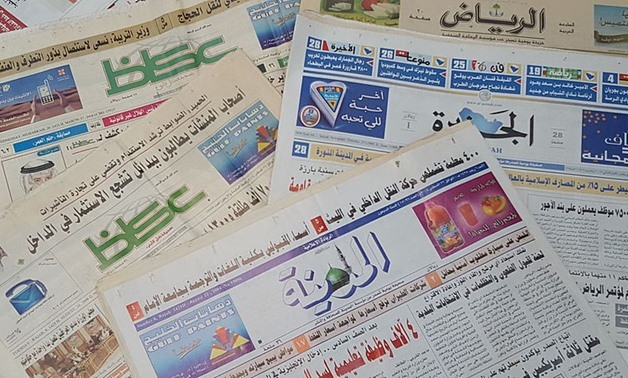
photo newspaper
CAIRO - 7 July 2019: The Supreme Council for Media Regulation headed by Makram Mohamed Ahmed, identified a number of cases to get a license for any newspaper, informational media or electronic website in accordance with the National Press Authority (NPA) law.
According to the law, no license or permit may be obtained if media outlets are based on religious or doctrinal discrimination or discrimination on grounds of sex or origin, or on a sectarian or ethnic basis, or call for an activity hostile to the principles of democracy,or an activity of a confidential nature or call for incitement to pornography, hatred or violence.
It is also prohibited to establish websites in Egypt operating from abroad without obtaining a license from the Supreme Council in accordance with the rules and conditions set by the Council.
In the same context, in August 2018, President Abdel Fatah al-Sisi ratified law No. 179 of 2018 to regulate the National Press Authority (NPA); the law was previously approved by the Parliament.
The executive regulations of the law are expected to be issued by the cabinet within the three coming months. The decree was published in the official gazette.
Shortly after being ratified by parliament, the journalism law caused a huge state of controversy among journalists and raised several questions on whether it will preserve their rights or impose more restrains over media in Egypt.
The new law consists of seven sections and specifies the administrative construction of newspapers' high board, owners and defines exactly what it means to be a journalist.
According to the new law, a journalist is “anyone listed as a member of the Journalists Syndicate.” The new law also lists the National Media Authority and the National Press Authority rights to interfere, manage and direct all of the Egyptian media outlets.
Several concerns were raised by a number of members of the Journalists Syndicate regarding the new law. A debate was launched on the ground and on social media between supporters and opponents of the new law.
In the opposing statement, which was signed by hundreds of journalists, the Journalists Syndicate members listed several points referring to the new law as “standing against the freedom of media and journalists.”
However, other officials described the new law as “balanced.” Head of Parliament’s Media, Culture and Antiquities Committee, Osama Heikal, said in statements to media outlets that the new law sets a number of the needed principles to regulate media work inside the country, adding that the law is balanced and protects journalists and their rights.
Some administrative regulations were among the criticized points in the new law, including: reducing the representation of journalists in the board of directors to the minimum and appointing half of the board members from outside the media institution, as well as allowing the National Press Authority to directly manage the newspapers board of directors and public associations.
“The new law doesn’t allow the newspapers' board to make any important decisions without getting the authority's permission,” the statement read.
According to the statement, the new law also stipulates that the journalists have the right to reach for all the information they need; however, the law didn’t impose any punishment on anyone who hinders their access to information.
The statement signers also criticized the National Media Authority's capability to impose sanctions over journalists and the Journalists Syndicate.
Moreover, the media draft law included several terms and words which could be described as elastic and incomprehensible, according to the statement, such as “spreading hatred, incitement, threat of democracy", and many others. Several other notes were listed in the statement, commenting on some of the privileges granted to journalists by the draft law, including criminalizing any attack on journalists while on duty.
Article 100 of the new law states that: “Any person who transgresses a journalist during or because of his work shall be punished by imprisonment and a fine of not less than LE 10,000 and not more than LE 20,000 or one of these penalties.”
During the Parliament's plenary session on Sunday, MP Heikal, said that the draft law covers all aspects of media and press activities in Egypt, and does not include any articles that could send journalists to jail in publication offences.
The Supreme Council for Media Regulation has issued a statement in April 2019, warning TV channels against airing from outside the Media Production City headquarters.
Below is the statement:
The Supreme Council for Media Regulations warns channels of broadcasting from outside the media production city.
The Supreme Council for Media Regulation (SCMR) has sent several letters to a number of broadcasters and television channels that own Satellite news gathering “SNG” units, stating that they should broadcast from within the media production city and to [that they are] limited to studios available within the city.
An official source in the council said that these letters come as part of the regulation of the media scenes, in accordance with the law and authorities it provides for the council in this regard. It also comes after the council spotted some companies broadcasting from outside the city, and violating the law 180 of 2018.
The law states in Article 59 that no broadcasting or re-broadcasting is allowed outside the locations approved by the Supreme Council. In addition to this, it is permissible to broadcast from outside these areas, provided that the office or company has a studio from which it can operate within the Egyptian Company for Media Production City, and to have a permission issued by the Council in prior.
The source pointed out that the council had granted the channels a period of three months to reconcile their status, noting that the permits obtained by those channels will expire within days and will not be renewed unless they settle their status.

Comments
Leave a Comment